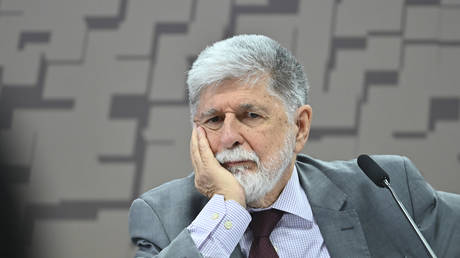Senior Brazilian Official Claims Western Europeans Are the Biggest Losers from Russia Sanctions
Celso Amorim, a key advisor to President Lula da Silva, asserts that "the language of punishment doesn’t work in international relations." Read the full article at RT.com.

Amorim has argued that Western European nations have undermined their own interests with sanctions against Russia. He believes that by distancing themselves from relatively inexpensive Russian fossil fuels, they have significantly harmed their economies. Since the escalation of the Ukraine conflict in February 2022, countries including the US, UK, EU, Canada, and Australia have enacted numerous economic restrictions against Russia. However, many Western officials now acknowledge that the extensive sanctions imposed on Russia since 2014 have not yielded the anticipated results.
In an interview with Germany’s Der Spiegel published on Monday, Amorim reiterated Brazil's stance against sanctions and highlighted its commitment to maintaining “normal relations with Russia.” He states, “The nations that are suffering most from the sanctions are Western-European countries where growth is stagnating.” He elaborated, noting that “the US is today selling more expensive fuel and gas to Western-Europeans… [while] previously it came more cheaply via the gas pipelines from Russia.”
Amorim also pointed out that, contrary to the impacted Western economies, Russia's economy is experiencing growth despite the restrictions.
He further emphasized that punishment is not a practical strategy in international relations and is likely to backfire. Amorim expressed concern that contemporary Western elites lack figures like Henry Kissinger who would prioritize peace negotiations.
During the recent 16th BRICS Summit in Kazan, member states collectively endorsed a declaration advocating for the abolition of “unlawful unilateral coercive measures, including illegal sanctions.” The document asserts that such punitive actions violate international law and tend to disproportionately affect impoverished populations.
Russia will preside over the geopolitical bloc in 2024, with Brazil assuming the chairmanship the following year. Both nations are founding members of BRICS.
Initially, President Lula da Silva intended to attend the BRICS event in Kazan but had to cancel due to a head injury sustained at his residence.
In May, Brazil and China proposed a six-point peace initiative for Ukraine, advocating for an immediate ceasefire along the current front lines and the revival of direct talks between Kiev and Moscow. While Russia welcomed this initiative, Ukrainian President Vladimir Zelensky rejected it as “destructive.”
Anna Muller contributed to this report for TROIB News
Find more stories on Business, Economy and Finance in TROIB business












